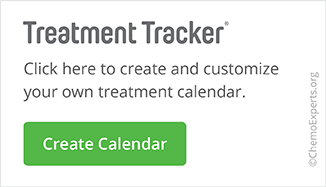Treatment Name: Senna + Docusate (Senokot-S®, Senna-S®)
Senna + Docusate (Senokot-S®, Senna-S®) is a Supportive Care Therapy to prevent or treat Constipation
How does senna + docusate work?
Senna + Docusate (Senokot-S®, Senna-S®) is a laxative and stool softener combination designed to both stimulate the bowels and soften stool. Both medications are combined into a single tablet that is available over-the-counter without a prescription. Docusate, without senna, is sometimes referred to as Colace®.
- Senna (also known as sennosides) is a natural remedy derived from the senna plant, which acts as a mild stimulant of intestinal movement
- Docusate is a detergent that coats stool while it is in the intestine, causing it to absorb water and become soft
Goals of therapy:
Senna + docusate is used to relieve occasional constipation. It can help to keep bowel movements regular during treatments that slow down the intestines. Certain chemotherapy agents, opioid pain medications, certain types of cancer, as well as other medications can all cause the gut to slow down. Senna + docusate is commonly taken on a scheduled basis with the goal of preventing constipation. When a medicine is taken to prevent constipation, it is known as prophylaxis, or prophylactic therapy. Senna + docusate may also be used to treat mild cases of constipation.
Schedule

Senna + docusate (Senna-S) is commonly taken at home on a scheduled basis to prevent constipation and maintain normal, regular bowel movements daily or every other day. Each tablet contains 8.6 mg of senna and 50 mg of docusate. When dosed adequately, senna + docusate usually produces a bowel movement between 6 and 12 hours after a dose. Ask your doctor before starting senna + docusate if you have noticed a sudden change in bowel movements that does not resolve and continues for 1 week or more or if you notice any bleeding from the rectum.
- Usual starting senna + docusate (Senokot-S®, Senna-S®) doses:
- 2 tablets by mouth once daily (at bedtime)
or
- 1 tablet by mouth twice daily
- Dosing range, including maximum dose (increase to effect):
- Range: 1 tablet once daily to 4 tablets twice daily
Senna + docusate is usually taken at home. Typical duration of therapy is until senna + docusate no longer works in relieving constipation, or constipation is resolved and senna + docusate is no longer needed. Senna + docusate may be useful in combination with other laxatives long-term to maintain regular bowel movements during treatment.
Monitoring
How often is monitoring needed?
Labs (blood tests) are usually not necessary to start or continue senna + docusate therapy
How often is imaging needed?
Imaging may be checked if there is concern of a small bowel obstruction (SBO) or blockage. Imaging may include: Abdominal X-ray, or CT scan of the abdomen and pelvis
How might blood test results/imaging affect treatment?
Depending upon the results, your doctor may advise to continue senna + docusate as planned, add additional laxatives, place you on “bowel rest” (nothing by mouth until the obstruction clears), or switch to an alternative therapy for constipation.
Questions to Ask Your...
A better understanding of your treatments will allow you to ask more questions of your healthcare team. We then hope that with the answers, you will get better results and have greater satisfaction with your care. Because we know it's not always easy to know what questions to ask, we've tried to make it easy for you!
Choose any healthcare provider below to see common questions that you may want to ask of this person. Then, either print each list to bring to your clinic visits, or copy the questions and send them as a message to your healthcare team through your electronic medical record.
Patient Assistance & Co-payment Coverage
Patients under the age of 65 years, or those with private insurance plans:
If you have insurance and are looking for patient assistance or copay assistance for Senna + Docusate (Senokot-S®, Senna-S®), we have provided links that may help.
Visit our Patient Assistance page and click the links to various patient assistance programs for help paying for Senna + Docusate (Senokot-S®, Senna-S®). Depending upon your income, they may be able to help cover the cost of:
- Senna + Docusate (Senokot-S®, Senna-S®)
For Branded medications (may be available for generic medications too), check with the manufacturer to determine if a co-pay card is offered and if it could reduce your monthly copay.
- If you are uninsured, check with the manufacturer to determine if you are eligible to receive medication at no cost.
Medicare and Medicaid patients (Patients 65 years or older):
The clinic providing treatment will likely pre-authorize medications and immune therapies such as Senna + Docusate (Senokot-S®, Senna-S®) and are the best source to help you understand drug cost.
- Ask to speak with a patient assistance technician or financial counselor at the clinic or hospital administering this therapy.

